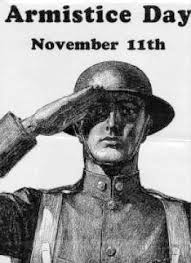 It was called “the war to end all wars.” It didn’t, of course. But when—on the eleventh hour of the eleventh day of the eleventh month in 1918—a cessation of hostilities between the Allied forces and Germany was declared, those who had witnessed the unfathomable death and destruction of the bloodiest conflict thus far in human history were exceedingly glad the Great War was, at last, over.
It was called “the war to end all wars.” It didn’t, of course. But when—on the eleventh hour of the eleventh day of the eleventh month in 1918—a cessation of hostilities between the Allied forces and Germany was declared, those who had witnessed the unfathomable death and destruction of the bloodiest conflict thus far in human history were exceedingly glad the Great War was, at last, over.
Officially, it wasn’t. An “armistice”–defined as a temporary truce–had been agreed upon. It expired 36 days later and was extended several times before the Treaty of Versailles formally ended World War I on June 28, 1919. President Woodrow Wilson declared November 11 “Armistice Day,” a day henceforth dedicated to respectful remembrance and to the cause of world peace. In 1938, Armistice Day became a federal holiday.
In the two decades that followed, the United States became involved in two more wars–World War II and the Korean conflict. Veterans’ service organizations believed, and rightly so, that veterans from all branches of the military who had served during any conflict—not just the first World War—should be honored.
Congress agreed. In 1954, the name of the holiday was changed from Armistice Day to Veterans Day.
In 1968, in an effort to create more three-day weekends, Congress passed the Uniform Monday Holiday Act. It moved Washington’s Birthday, Memorial Day, Labor Day, Columbus Day and Veterans Day to a Monday. That was okay with most folks, with the exception of one of those holidays. Many Americans believed that November 11 held too much historical and patriotic significance to change it. President Gerald Ford signed legislation to return Veterans Day to November 11, effective in 1978.
There it has remained ever since.
Sad to say, the United States has been involved in many additional wars since Armistice Day became Veterans Day. November 11 continues to offer Americans the opportunity to honor and to thank those whose military service helps protect our freedom. Unlike Memorial Day, which is observed on the last Monday in May and which is set aside to honor and remember those who died while serving in the armed forces, Veterans Day celebrates the living, too.
You can take part in the Putnam County celebration by attending the annual Veterans Day parade, which begins at 11:00 tomorrow morning—rain or shine–on the courthouse square. I promise it will be a moving experience.
Last but not least, for those punctuation sticklers who are never sure where to put the apostrophe when writing the name of tomorrow’s holiday, I happily share this advice. Don’t use an apostrophe at all. It’s not a day belonging to one veteran, which would be written Veteran’s Day. It’s not a day belonging to more than one veteran, which would be written Veterans’ Day. Both of those choices are the possessive punctuation of the word, which would imply that the day is owned by a veteran or veterans.
Instead, the word “Veterans” with no apostrophe is the attributive use of the word, modifying the noun “Day” without a linking verb. Other examples of this grammatical structure include apple pie, airplane pilot and television screen. Sure, it’s a somewhat complicated explanation but certainly no more difficult that learning to spell the word “Armistice.”
But how you punctuate it or even if you chose to call it Armistice Day doesn’t really matter. What does matter is that you stop whatever you’re doing tomorrow morning at 11:00 and take time to remember the debt we owe to all of our heroes in uniform.
(November 10, 2019)